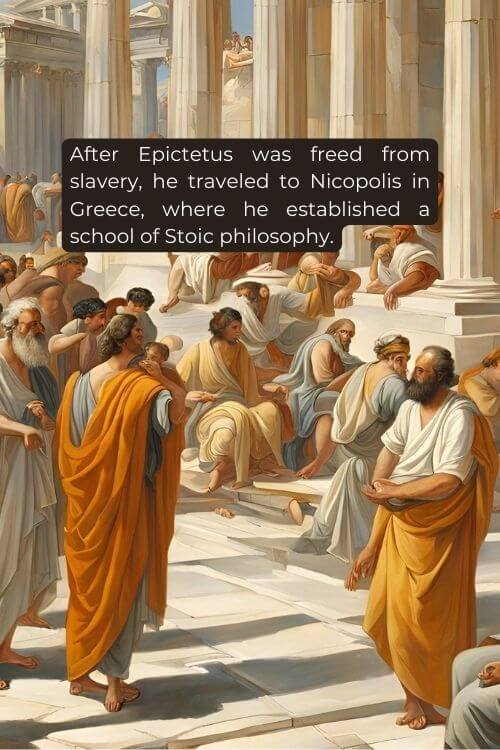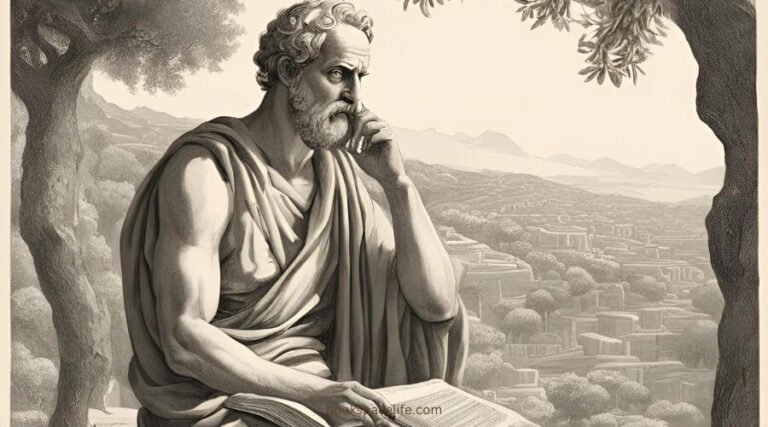Thales of Miletus
Epictetus: The Stoic Philosopher of Resilience and Freedom
Epictetus (50 – 135 CE), a prominent Stoic philosopher of the first century CE, is best known for his profound insights into the nature of human freedom, the importance of self-discipline, and the pursuit of virtue.
Born into slavery, he overcame significant challenges to become one of the most influential thinkers of the Stoic school, leaving behind a legacy that resonates through the ages.
His teachings emphasize the power of the mind in shaping one’s experiences and responses to life’s challenges.
This blog post will explore Epictetus’s life, philosophy, and enduring influence on both ancient and modern thought.
Quick Read
Table of Contents
(1) Early Life and Education
Epictetus was born around 55 CE in Hierapolis, a city in Phrygia (modern-day Turkey).
His early life was marked by adversity; he was born into slavery and belonged to a wealthy Roman named Epaphroditus, who was a freedman and secretary to Emperor Nero.
The details of Epictetus’s early life remain somewhat obscure, but it is believed that he endured harsh treatment as a slave. Despite these conditions, he exhibited a thirst for knowledge and a resilient spirit.
During his time as a slave, Epictetus had the opportunity to study Stoicism, likely influenced by the teachings of Musonius Rufus, a noted Stoic philosopher.
Musonius emphasized the application of Stoic principles to everyday life, which resonated deeply with Epictetus. This educational background laid the foundation for his future philosophical pursuits.

(2) Philosophical Development and Travels
Epictetus’s journey as a philosopher truly began after gaining his freedom around 68 CE. He moved to Nicopolis, a city in Epirus (northwestern Greece), where he established a school of philosophy. Here, he taught a diverse group of students, sharing his insights on Stoicism and the importance of personal virtue.
Epictetus did not travel extensively in the same manner as other philosophers, but he engaged with the world through his teachings and interactions with students. He emphasized the importance of living in accordance with nature and accepting the things we cannot control, which became central themes in his philosophy. His ideas were recorded by one of his students, Arrian, in a collection known as the “Discourses,” as well as in the “Enchiridion,” a manual for living a Stoic life.
(3) Philosophy of Epictetus
Epictetus’s philosophy centers around several key themes that reflect his Stoic beliefs:
- The Dichotomy of Control: One of the foundational concepts in Epictetus’s philosophy is the distinction between what is within our control and what is not. He taught that individuals should focus on their own thoughts, intentions, and reactions—elements that they can influence—while accepting external events and circumstances as beyond their control. This principle is famously summarized in the “Enchiridion”: “Some things are up to us and some are not.”
- The Importance of Virtue: For Epictetus, virtue is the highest good. He believed that living a virtuous life is essential for achieving true happiness and fulfillment. This virtue is cultivated through the practice of self-discipline, wisdom, and ethical behavior, allowing individuals to align their actions with their values.
- Acceptance of Fate: Epictetus emphasized the importance of accepting the natural order of things. He taught that suffering is a part of life, and rather than resisting or lamenting it, individuals should embrace their experiences as opportunities for growth and learning. This acceptance leads to a sense of inner peace and resilience.
- The Role of Reason: Epictetus believed that human beings possess the unique capacity for reason, which allows them to navigate life’s challenges. By employing reason, individuals can cultivate a sense of perspective, understanding that their thoughts shape their experiences. This cognitive approach aligns with modern psychological practices, such as cognitive-behavioral therapy (CBT).
- Community and Relationships: While Stoicism is often viewed as an individualistic philosophy, Epictetus recognized the importance of community and relationships. He taught that individuals should strive to act justly towards others and foster healthy connections. The Stoic ideal of cosmopolitanism encourages the recognition of shared humanity and mutual respect.

(4) Influence and Impact
Epictetus’s influence extends far beyond his own time, shaping the course of philosophy and ethics throughout history. His teachings have impacted a wide range of fields, including psychology, literature, and religion.
- Stoicism and Later Philosophers: Epictetus’s ideas played a crucial role in the development of later Stoic thinkers, including Seneca and Marcus Aurelius. Marcus Aurelius, in particular, was heavily influenced by Epictetus’s teachings, as evidenced by his writings in “Meditations,” which reflect Stoic principles of resilience, acceptance, and virtue.
- Christianity: The early Christian Church also drew upon Stoic ideas, including those of Epictetus. Concepts such as the acceptance of suffering and the importance of virtue found resonance in Christian teachings. Figures like Augustine acknowledged the influence of Stoicism on their philosophical and theological development.
- Modern Psychology: The dichotomy of control articulated by Epictetus has been particularly influential in modern psychology. Cognitive-behavioral therapy, which emphasizes the importance of changing thought patterns to improve emotional well-being, mirrors many of Epictetus’s teachings. The idea that our perceptions shape our experiences is a central tenet of CBT.
- Ethics and Leadership: Epictetus’s emphasis on virtue and character has informed discussions of ethics in various contexts, including business and leadership. His teachings encourage individuals to lead with integrity, prioritize ethical behavior, and cultivate a sense of responsibility towards others.
- Resilience Training: In contemporary discussions of resilience and mental health, Epictetus’s teachings on acceptance and emotional regulation are increasingly recognized as valuable tools for navigating life’s challenges. His insights resonate with individuals seeking strategies for coping with adversity and cultivating a resilient mindset.
- Literature and Culture: Epictetus’s works, particularly the “Discourses” and “Enchiridion,” have been widely read and studied throughout the centuries. His teachings have inspired writers, poets, and philosophers, becoming a staple of philosophical literature that continues to engage readers today.
(5) Conclusion
Epictetus’s life and philosophy exemplify the power of resilience, reason, and virtue in the face of adversity.
Born into slavery, he rose to prominence as a philosopher and teacher, sharing his insights on the nature of freedom, the importance of self-discipline, and the acceptance of fate.
His teachings, recorded by his student Arrian, continue to inspire individuals seeking wisdom and guidance in their lives.
In a world characterized by uncertainty and turmoil, Epictetus’s philosophy serves as a reminder of the inner strength that lies within each of us.
His emphasis on the dichotomy of control encourages individuals to focus on what they can influence while accepting the inevitability of external events.
By embodying the principles of Stoicism, we can cultivate a sense of peace, purpose, and resilience in the face of life’s challenges.
As we navigate the complexities of modern existence, the teachings of Epictetus remain as relevant today as they were in ancient Rome.
His wisdom invites us to embrace the journey of self-discovery, to cultivate virtuous living, and to find freedom within ourselves, regardless of our circumstances.
Through the lens of Epictetus’s philosophy, we can learn to approach life with a sense of equanimity, purpose, and an unwavering commitment to living in accordance with our values.Top of Form
(A) 7 Quick Facts on Epictetus
- Birthplace – Epictetus was born around 55 CE in Hierapolis, Phrygia (modern-day Turkey), into a slave family.
- Early Life – He was brought to Rome as a slave, where he was owned by a wealthy man named Epaphroditus.
- Education – While enslaved, he studied Stoic philosophy under Musonius Rufus, who greatly influenced his thinking.
- Freedom – Epictetus gained his freedom and became a prominent teacher of philosophy.
- Travel – After gaining freedom, he traveled to Nicopolis in Greece, where he established a school of Stoic philosophy.
- Philosophical Works – His teachings were recorded by his student Arrian in “Discourses” and “Enchiridion,” emphasizing Stoic ethics and practical philosophy.
- Death – Epictetus died around 135 CE, leaving a legacy as one of the most influential Stoic philosophers, shaping future thought on ethics and resilience.
(B) 10 Quotes attributed to Epictetus
- It’s not what happens to you, but how you react to it that matters. Emphasizing the importance of our responses to external events.
- We have two ears and one mouth so that we can listen twice as much as we speak. Highlighting the value of listening over speaking.
- The more we value things outside our control, the less control we have. Stressing the importance of focusing on what we can control.
- No man is free who is not master of himself. Defining true freedom as self-control and mastery over one’s thoughts and actions.
- Freedom is the only worthy goal in life. It is won by disregarding things that lie beyond our control. Encouraging liberation from desires for things we cannot control.
- If you want to improve, be content to be thought foolish and stupid. Advocating for the humility needed for personal growth and learning.
- First say to yourself what you would be; and then do what you have to do. Emphasizing the importance of self-definition and action.
- Don’t explain your philosophy. Embody it. Encouraging the practice of philosophy through action rather than mere words.
- The key is to keep company only with people who uplift you. Highlighting the influence of our social circles on our well-being.
- It is impossible for a man to learn what he thinks he already knows. Stressing the importance of humility and open-mindedness in the pursuit of knowledge.








